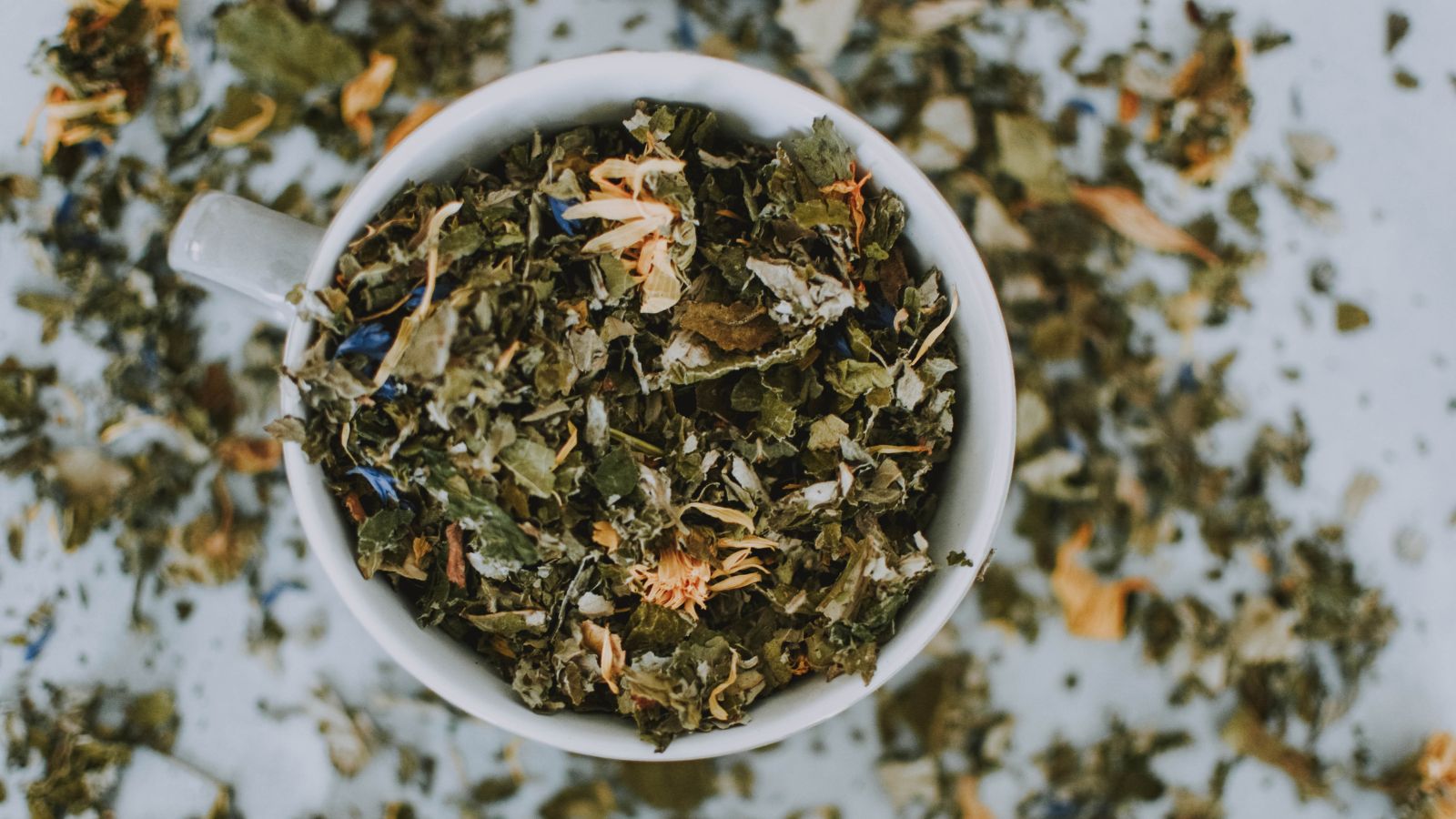In a world increasingly defined by stress, adaptogens are a natural solution to help the body find balance. These unique plants and fungi have been used for centuries in Ayurvedic and Chinese medicine, but their modern resurgence owes much to a term coined in 1947 by Soviet scientists. Seeking ways to enhance resilience and endurance, researchers discovered that certain botanicals could help the body adapt to stress and maintain homeostasis.
Today, adaptogens are at the forefront of wellness trends, offering a potential antidote to the pressures of modern living while sparking curiosity about their ancient roots and scientific potential.

What Are Adaptogens?
Dr. Nikolai Lazarev, a Soviet scientist, first coined the term “adaptogen” in 1947 under grants from the military. The grants provided funding for him to research substances that would produce a state of nonspecific resistance or SNIR. They hoped a substance that produced this nonspecific resistance would enhance the productivity and performance of soldiers, athletes, and workers at a lower cost than stimulants. This research led them to adopt the term “adaptogensis,” which describes any remedy that increases an organism’s resistance to biological stress.
In 1969, Soviet scientists I.I. Brekhman and I.V. Dardymov further defined adaptogenic substances based on three pharmacological properties. The first property requires the substance to be relatively non-toxic to the recipient, allowing for safe consumption and use. An adaptogen must also have “non-specific” activity, which means the substance must increase an organism’s resistance to a wide range of adverse biological, chemical, and physical factors. Finally, the substance must help regulate and normalize an organism’s organ and system function.
Currently, scientists believe an adaptogen produces these pharmacological effects by affecting the hypothalamic-pituitary-adrenal axis and peripheral nervous system.
Adaptogenic Herbs List
Common adaptogenic herbs include:
- Panax ginseng – Also referred to as Korean or Asian ginseng.
- Panax quinquefolius – Commonly referred to as American ginseng.
- Rhodiola rosea – Also known as arctic root or golden root.
- Astragalus membranaceus and Astragalus mongholicus – Commonly referred to as huang qi.
- Withania somnifera – Commonly known as Ashwagandha.
- Glycyrrhiza glabra root – Commonly referred to as Licorice root.
- Schisandra chinensis – Along with other species within the Schisandra genus.
- Uncaria tomentosa – Commonly referred to as Cat’s claw.
- Centella asiatica – Commonly known as Gotu kola.
Adaptogenic Mushrooms list
Common adaptogenic mushrooms include:
- Reishi (Ganoderma lucidum) – Known as “lingzhi” in Chinese medicine, it’s prized for its calming properties and immune support.
- Cordyceps (Cordyceps militaris, Cordyceps sinensis) – Often used for energy, endurance, and supporting respiratory health.
- Maitake (Grifola frondosa) – Believed to support immune function and overall vitality.
- Chaga (Inonotus obliquus) – Known for its high antioxidant content and immune-boosting properties.
- Lion’s Mane (Hericium erinaceus) – Valued for its potential to support cognitive function and nerve regeneration.
- Turkey Tail (Trametes versicolor) – Used for its immune-modulating effects and gut health support.
- Shiitake (Lentinula edodes) – Known for its immune-supportive properties and rich nutritional profile.
- Agaricus (Agaricus blazei Murill) – Sometimes called “Royal Sun Agaricus,” known for its immune-enhancing and anti-inflammatory benefits.
- Poria (Wolfiporia extensa) – A lesser-known adaptogen used in traditional Chinese medicine for calming and digestive health.
- Tremella (Tremella fuciformis) – Often referred to as “snow mushroom,” it’s popular for its hydration benefits and skin health support.

Common Ways of Using Adaptogens
Incorporating adaptogens into your daily routine has never been easier, thanks to their growing popularity in the wellness community. From teas to supplements, adaptogens are now available in a variety of formats, making it simple to find an option that fits your lifestyle. Here are some of the most popular ways to consume adaptogens, along with tips on how to get the most out of them.
Adaptogenic Tea
One of the most traditional ways to consume adaptogens is through tea. Adaptogenic teas are often made from the roots, leaves, or mushrooms of adaptogenic plants, offering a soothing ritual that delivers a host of benefits. For example:
- Ashwagandha tea is valued for its calming properties and ability to support stress management.
- Rhodiola tea is often used to enhance focus and stamina.
- Mushroom teas, like those made with cordyceps or reishi, are prized for their immune-boosting and stress-regulating properties.
Making tea is simple: bring water to a boil, add your chosen adaptogen (e.g., mushroom slices or dried roots), let it steep for 5–10 minutes, and strain before drinking. For mushrooms like cordyceps or reishi, you may want to simmer them longer to extract more active compounds. Adding honey, lemon, or spices like cinnamon can help enhance the flavor.
Adaptogen Coffee
For those who can’t start the day without a cup of coffee, adding adaptogens can transform your morning routine. Many people mix adaptogenic powders—like ashwagandha, cordyceps, or lion’s mane—into their coffee to help reduce caffeine jitters while enhancing focus and energy. This combination can provide a smoother, more sustained boost without the typical caffeine crash.
The popularity of adaptogen coffee has surged in recent years, with pre-blended powders and instant adaptogenic coffee mixes readily available. These blends often include additional herbs or mushrooms tailored to specific goals, such as stress reduction or enhanced cognitive function.
Want to skip the trial and error period? We’ve put together a list of our favorite mushroom coffees on the market.
Adaptogen Tinctures
Tinctures are a concentrated and convenient way to consume adaptogens. These liquid extracts are typically made by steeping adaptogenic herbs or mushrooms in alcohol or another solvent to draw out their active compounds. After the extraction process, the alcohol is often boiled off, leaving behind a potent liquid packed with adaptogenic benefits.
Tinctures are versatile: you can take them sublingually (a few drops under the tongue for fast absorption) or mix them into water, tea, or smoothies. Popular adaptogens like reishi, schisandra, and ashwagandha are often available in tincture form.
There are so many incredible tinctures out there, but we’ve been enjoying the Journey Collection from Allies Botanicals.
Adaptogen Supplements
For maximum convenience, supplements are a go-to option. Capsules, tablets, and powders allow for precise dosing and are easily incorporated into a daily routine. Many adaptogen supplements are formulated with blends of herbs and mushrooms to target specific needs, such as reducing stress, improving sleep, or boosting energy.
When choosing a supplement, it’s important to look for high-quality products with clear labeling, such as standardized extracts that ensure consistent potency. Reading reviews and checking for third-party testing can help you find trustworthy brands.
Adaptogen Beverages
Adaptogenic beverages are a refreshing and functional way to incorporate the benefits of adaptogens into your daily routine. From teas to sparkling drinks, these beverages are designed to support everything from stress relief to enhanced focus and immunity. As the popularity of adaptogens grows, the variety of drink options has expanded, offering something for everyone—whether you’re looking for a morning boost, an afternoon pick-me-up, or a calming ritual before bed.
RIVR takes adaptogenic beverages to the next level with its innovative offerings. Their functional mushroom teas and THC microdosed drinks are crafted with potent combinations of adaptogens like ashwagandha, lion’s mane, cordyceps, and reishi.
Each drink is tailored to support specific vibes or moods, blending ancient adaptogenic wisdom with modern formulations. Whether you’re sipping their teas to promote focus and calm or enjoying their THC microdosed drinks before an adventure, RIVR delivers adaptogenic benefits in a convenient and flavorful format.

What Are the Benefits of Adaptogens?
Scientists believe adaptogens hold a wide range of benefits. Ancient Indian medicine commonly referred to as Ayurvedic medicine, and traditional Chinese medicine heavily relies on adaptogenic plants for promoting overall well-being. A recent systematic review of studies on adaptogens set out to determine whether these benefits are statistically significant or whether the benefits reported in both these medicinal systems are primarily from the placebo effect.
The way adaptogens interact with the hypothalamic-pituitary-adrenal axis and the peripheral nervous system most likely cause the majority of their beneficial effects. Different adaptogens affect these systems in different ways, resulting in a wide range of possible benefits from the various adaptogens.
Anxiety and Stress
Adaptogens are renowned for their ability to help the body manage stress and anxiety by supporting a balanced stress response. Ashwagandha is one of the most studied adaptogens in this category, often used to regulate cortisol levels and promote a sense of calm and focus.
Other adaptogens, such as Rhodiola rosea, known for boosting mental clarity and reducing burnout, and Holy Basil (Tulsi), celebrated for its mood-enhancing properties, also offer powerful stress-relief benefits. Schisandra chinensis and Siberian Ginseng further complement these effects by supporting mental endurance and resilience.
By interacting with the hypothalamic-pituitary-adrenal (HPA) axis, these adaptogens help the body adapt to stress, promoting emotional and physical well-being. Whether you’re seeking to reduce anxiety, improve focus, or regain balance, adaptogens offer natural and versatile solutions to help you thrive.
Sleep
Sleep-related problems such as insomnia affect the daily lives of countless individuals throughout the world. The primary cause of these sleep-related problems stems from external stress, causing fluctuations from a normal secretion of circadian cortisol. This cortisol secretion in a healthy individual peaks shortly after they wake then decreases throughout the day allowing for a restful sleep.
Adaptogens help stabilize the secretion of circadian cortisol to regulate it throughout the day. Studies have suggested various adaptogens act as sleep aids through this effect. These adaptogens include Panax quniquefolius, Schisandra chinensis, and Sedum rosea.
Immune Health
Adaptogens work in three primary ways to promote immune health. First, they stabilize biological responses that remodel the immune system, enhancing the body’s non-specific resistance to pathogens.
Second, they promote bone marrow production, which improves blood cell counts. More blood cells, in the long run, will help other cells in our bodies have nutrients to keep fighting efficiently against pathogens.
Third, adaptogens decrease the amount of cortisol, the stress hormone, that the adrenal glands secrete. Cortisol in excessive amounts weakens our immune system. Adaptogens help the body use it more efficiently.
Fatigue
The primary cause of fatigue is external stress, which results in the adrenal gland secreting excessive hormones. Once the adrenal gland secretes these hormones, it can no longer achieve normal homeostasis due to a lack of regular hormones. Adaptogens can increase the effectiveness of adrenal gland secretion, helping it back up to normal homeostasis. This allows the adrenal gland to stop producing excessive amounts of hormones. The most effective adaptogens for reducing adrenal fatigue are Panax ginseng and Eleutherococcus senticosus.
Scientists believe Panax ginseng inhibits 11-beta hydroxysteroid dehydrogenase and Eleutherococcus senticosus inhibits catechol-O-methyl transferase. Both reside near various stress hormone receptors and catalyze the degradation of stress hormones into inactive compounds. This reduces the excessive secretion of stress hormones by the adrenal gland.
They also accelerate the closure of the adrenal gland in the absence of stress, increase cellular energy levels, and prevent oxidative damage. All of this promotes the healthy function of the adrenal gland ,which reduces fatigue levels in healthy humans.
How Long Does it Take for Adaptogens to Work?
The timeline for adaptogens to take effect can vary depending on the individual, the specific adaptogen, and the health goals being addressed. While modern science has yet to pinpoint an exact timeframe, many users report that adaptogens often require consistent use over a period of weeks to deliver noticeable benefits. Unlike stimulants that provide immediate effects, adaptogens work gradually, supporting the body’s natural processes to build resilience and balance over time.
Anecdotal evidence suggests that it can take two to four weeks of daily use for adaptogens to accumulate in the body and begin showing results. For best absorption, many experts recommend consuming adaptogens with meals, as this may enhance their bioavailability. While patience is key, establishing a regular routine can help you evaluate whether adaptogens meet your needs and support your wellness goals.

How Long Should You Take Adaptogens?
The ideal duration for taking adaptogens varies depending on the specific adaptogen, the method of consumption, and individual wellness goals. While long-term studies on adaptogen use are limited, traditional practices and anecdotal evidence provide helpful guidelines.
In general, adaptogens are safe for extended use when consumed as recommended. However, it’s often suggested to take a “cycling approach”—using adaptogens for a period (e.g., 6–12 weeks) and then taking a break to allow the body to reset and avoid potential tolerance. This strategy can help maximize their benefits over time.
Recommended dosages vary by adaptogen and format:
- Tinctures: Typically used 1–3 times daily, depending on the concentration and adaptogen.
- Capsules: Follow manufacturer guidelines, as dosages depend on potency. Standardized extracts often have precise recommendations.
- Teas: Dosage can range from 1–6 teaspoons of adaptogen per serving, depending on the herb or mushroom used and individual preferences.
- Powders: Commonly mixed into beverages or food, powders should be measured based on the specific adaptogen and personal tolerance.
It’s important to consult with a healthcare professional when incorporating adaptogens into your routine, particularly if you are taking medications or managing a specific health condition. Listening to your body and tracking your progress can help determine the right duration and frequency for your adaptogen use.
What Are the Potential Side Effects of Adaptogens?
While adaptogens are generally considered safe for most people, it’s important to be mindful of potential side effects and the limitations of current research. One of the primary concerns is the lack of extensive scientific studies on adaptogens, particularly in terms of long-term effects. Although adaptogens have been used for centuries in traditional medicine, modern clinical trials are still limited, leaving some questions unanswered about their mechanisms and impacts.
Possible side effects can vary depending on the adaptogen, dosage, and individual sensitivity. Some people may experience:
- Increased anxiety or stress when first introducing adaptogens, particularly if the dosage is too high or the adaptogen isn’t well-suited to their needs.
- Insomnia or overstimulation, especially with energizing adaptogens like Rhodiola or ginseng, when taken too late in the day.
- Heart palpitations, particularly if combined with other stimulants like caffeine.
- Digestive upset, including nausea or stomach discomfort, especially in those sensitive to herbal compounds.
- Burnout or mania in rare cases, particularly with overuse or improper dosing.
It’s also worth noting that the stress response is complex and not fully understood, leading some critics to question whether regulating it through adaptogens always produces positive outcomes. Individual reactions can differ greatly, making it important to introduce adaptogens gradually and observe how your body responds.
If you have underlying health conditions, are pregnant or nursing, or are taking medications, consult a healthcare professional before using adaptogens. As with any supplement, starting with a low dose and monitoring for side effects is a good practice to ensure safe and effective use.

Wrapping It Up: Adaptogens in Your Wellness Routine
Adaptogens are an intriguing bridge between ancient herbal traditions and modern wellness needs. They offer a natural, versatile way to support your body’s ability to adapt to stress and maintain balance, whether through a calming cup of tea, a functional drink, or a convenient supplement.
While science is still catching up with centuries of traditional use, many people find adaptogens to be a helpful addition to their daily routines. The key is to start small, be consistent, and pay attention to what works best for your body. If you’re curious about trying adaptogens, there’s never been a better time to explore the growing array of options out there.
Whether you’re looking to boost energy, manage stress, or simply feel a little more grounded, adaptogens just might be the wellness tool you’ve been looking for. Cheers to discovering what they can do for you.















